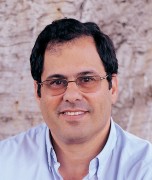This is what Yeda Company, the commercial arm of the Weizmann Institute, announces at the Biomed 2010 conference

Yeda, the commercial arm of the Weizmann Institute of Science, will present a new technology developed at the institute, during Biomed Israel Week 2010, which will be held on June 14-16 in Tel Aviv, which enables the selective inhibition of the entry of control proteins into the cell nucleus using protein segments (peptides). The movement of proteins used as growth factors into the cell nucleus is an essential step in the regulation of vital cellular processes, such as division and differentiation. These processes go out of control in cancerous transformation, in which the cell undergoes accelerated division without appropriate control. Preventing growth factors from entering the nucleus may stop the constant division signals that the cell receives and delay the cancer growth process.
According to Professor Roni Zager, head of the research group carrying out the project, this technology has an advantage over other technologies in the field, because it does not inhibit the presence of the protein in the cell, which could lead to negative feedback, but focuses on preventing the passage of the same protein into the nucleus, where it is active in the growth processes. A different aspect of the same invention is the attachment of the sequence identified as being responsible for the transition to the nucleus to additional molecules, which may increase their penetration into the nucleus.
Among the expected applications of the new invention: treatment of cancer with peptides that prevent the transfer of proteins that encourage cancerous transformation to the nucleus, as well as the use of a mechanism identified as responsible for the penetration of proteins into the nucleus in order to enter the nucleus of other molecules.

One response
It is not clear how this will be done. That is, I assume that the prevention of division should be expressed only in the problem areas (cancerous) and not in all the cells of the body. That's why some technology is supposed to be used here to target the cancer cells, isn't it?